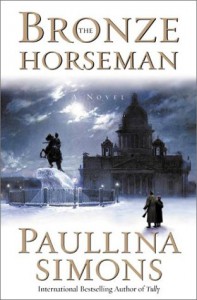
Review: The Bronze Horseman (The Bronze Horseman, #1)

This book came highly recommended by friends and reviewers, but I kept putting it off. Not because of the genre or anything about the book particularly. It just never looked that interesting.
The story is set in the USSR during the German invasion. Not a setting I’m familiar with, so I had to do some background research beforehand. I had read Doctor Zhivago awhile ago and loved it because it had that perfect union of engaging story and lyrical prose that I always look for in any book, regardless of genre. The Bronze Horseman seemed like it had similar themes or, at the very least, a contemporary echo of Doctor Zhivago, which in this case I wouldn’t have minded at all.
For some reason, there had always been something holding me back from this book, and I couldn’t figure out why. The star ratings were high, like unbelievably so across the board, and reviews by critics and average readers alike were glowing (they still are). Still, I never really felt like picking up this book and didn’t know why. And then I started reading. And everything that held me back suddenly made sense. Simply put, this book is just not for me, and I must have known that on a subconscious level.
Let me interrupt this review by saying the writing by itself is not terrible. The execution of the story, characterization (especially the two main characters), and the “romance” angle, on the other hand, are almost unbearable. I say “almost” because I did finish reading, so it wasn’t completely unbearable.
I’ll start with compliments and then ease into shortcomings.
The author’s depictions of pre-siege and post-siege Leningrad (St. Petersburg) are well done and very close to actual accounts from people who lived through the siege. A great number of people died of starvation within the city during this time. Those who survived had to scour for food any way they could. The way in which the author represents this particular era, through the perspective of one individual family, is well written and shows that she had done plenty of research. Had the story focused on the siege and its aftermath, I would have found this book a lot more interesting. So in other words, if the setting and context remain the same but the story is told from a different POV, accompanied by a completely different set of characters, it would be a richer story.
I read historical fiction for a different (hindsight) perspective of historical accounts. Already knowing what happens and the how’s and why’s of it only makes the stories more interesting, to me. History strengthens fiction by adding multiple perspectives into the mix which adds more depth to an already familiar event. When this is done well, fictional accounts read somewhat like actual historical accounts but with more depth, and this is what I look for in well crafted historical fiction. I think the Paullina Simons not only captured the events of the Siege of Leningrad but also the tense atmosphere of the era, the plight of the people, and the hopelessness of a city starving to death. If only she had approached characterization and plot with the same care.
Next comes the hard part because I really wanted to like this book. It had a lot of things going for it. Unfortunately, it didn’t work for me because the things that bothered me far outweighed the things that didn’t. So here goes.
(show spoiler)
Although this book wasn’t a good experience, I’m still interested in the Siege of Leningrad. A majority of books written about the siege are nonfiction. So far I’ve found only two other historical fictions (that might be worth my time), and they are David Benioff’s City of Thievesand Helen Dunmore’s The Siege.
 2
2
 2
2












